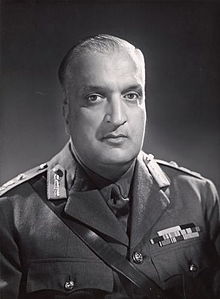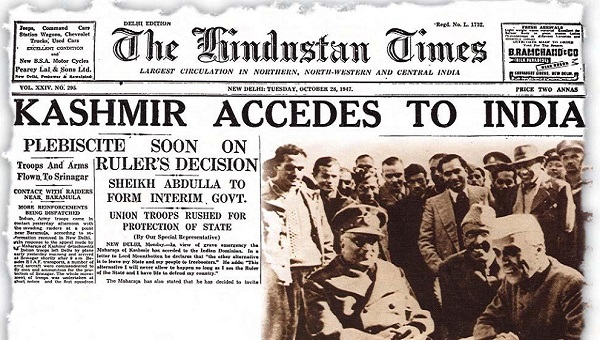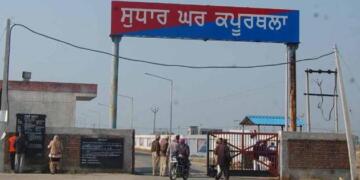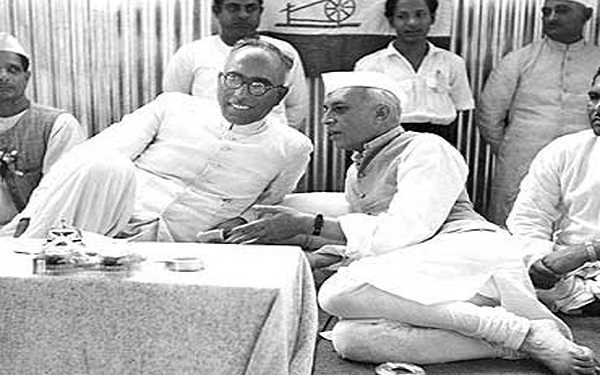Ever heard of a country so generous, that it agrees to give away an entire nation to a group of people who were yet to get over the hangover of imperialism? Ever heard of a country so generous that they give away their territories at a time, when their own army is almost on the verge of reclaiming it back? Ever heard of a leader so idiotic, that he turns a blind eye to the looming menace that he created in the lust of power? Well, if you haven’t, then welcome to modern India, which has seen all of the above. From pathetic leadership to awful retreats, we have it all.
Cut to 2017. The world is slowly bowing down to yet another evil force. This time, it is not the arrogance of Europe, nor is it the might of the two superpowers disturbing the whole world with their catfights. It is the malice of one ideology [I can’t even call it a religion], which hates to see the world progressing, and wants to subdue it under the flag of the malice that they name religion. This is the tide of Islamic imperialism, something much worse than the imperialism which Europe once subjected two thirds of the world, for Europe is itself a victim to it……
In case you are wondering why I am telling all this to you, it is because the tide of Islamic imperialism is also knocking at the doors of our very own India. They eye our prized crown, Jammu & Kashmir, and then slowly, the whole of India. They’re one of the uncountable enemies of India, who neither want us progressing, nor can bear our happiness even after facing so many adversities. It is imperative that we know our enemies very well, whether outside or inside. Thus, the name of the series is Know Thy Enemy, for which the first set of case files is on our crown and Pakistan’s envy, the state of Jammu & Kashmir, and how choosing wrong leaders led to the turbulent state of the ‘Heaven on Earth’ that Kashmir Valley once was.
Cut to 1947, when India was about to gain independence. Before India was officially free, it was still under British rule, even if as a formality. The final Viceroy of India, Lord Louis Mountbatten, oversaw the creation of the Union of India, under the able leadership of our own ‘Iron Man’, Sardar Vallabhbhai Jhaverbhai Patel, though he was forced to accept the rise of Pakistan too. By the time August 15th was to knock on the doors of India, except for a few states, Sardar Patel had managed to convince almost 560 territories, provinces and princely states to merge into the Union of India, through his powerful diplomacy and the able assistance and friendship of his aide, VP Menon.
Following were the states that refused to accept the sovereignty of the Union of India:-
- Travancore
- Hyderabad State
- Bhopal State or Central Provinces
- Junagadh State
- Jammu & Kashmir
Of the above, while Travancore and Bhopal were tactfully persuaded to join the Union of India, which Sardar Patel and VP Menon successfully carried out as well, Hyderabad, Junagadh and J&K refused to accept the decision. While J& K was in a dilemma of joining which side, and Hyderabad intended to carve out its own nation [this laughable decision will be discussed later], Junagadh, to make matters worse for India, decided to accede to Pakistan, under its ruler Nawab Muhammad Mahabat Khan III, without even consulting the populace of the province at all, who were all Hindus. Fun fact, the Gandhis of Pakistan [i.e. the ruling family post independence], i.e. the Bhuttos, were the Prime Ministers of this State, with Shah Nawaz Bhutto being the Diwan of Junagadh at the time of independence, and also a major force behind the decision of Junagadh acceding to Pakistan.
Sardar Patel understood the crafty intentions of the state and decided to surround the entire state, even when the Prime Minister of India [without doubt unfortunately] Jawaharlal Nehru persuaded him not to, for the fear of disturbing the sentiments of the ‘minorities’. Classic liberalism, eh?
Sardar Patel ignored the requests and carried out with his strategy of effective military siege on Junagadh, which was highly successful, thanks to the support of the local populace, which surprisingly included the minorities as well. A petrified Muhammad Mahabat Khan ran away with his entire family to Karachi, save one wife and his prized dogs. So much for joining his dreamland. But that is not why I have picked up this issue.
Jammu & Kashmir, nicknamed ‘Heaven on Earth’ for its serene landscapes and a charming panorama of spiritualism, cultural opulence and communal harmony, was under a volatile situation. The western neighbors, Pakistan, wanted the state to join them, for the reason that the majority community was Muslims, while India wanted J&K to join them, not just because there was a Hindu ruler at the helms, but also because the state represented India’s pride, and hence, could not be surrendered to the forces of Islamic imperialism and communalism.
The ruler, Maharaja Hari Singh, from the Dogra clan, was in an equal dilemma. On one hand, he had to face the tide of Pakistani tribals and armymen, disguised as locals, all set to invade his kingdom. On the other hand, he had to face the rising tide of protests by the local Kashmiris as well, under the leadership of revolutionary politician Sheikh Abdullah [who had some sense back then], chief of National Conference, who wanted the monarchy to end, and the voice of people to rule supreme.

(Wikipedia)
Into this league stepped in the invaders from Pakistan. Irritated by the tepid responses received from Maharaja Hari Singh, Muhammad Ali Jinnah ordered an attack on the state of Jammu & Kashmir, in order to forcibly occupy it. This wasn’t all, the catalyst to this event was the dismissal of Prime Minister Ram Chandra Kak by Maharaja Hari Singh, who advocated for either complete independence or a surrender to Pakistan, which led the Pakistani forces believe that the Maharaja was more tilted towards India.
Even though they had efficient British origin officers at their disposal, it was the secret army of spy soldiers, disguised as local Pathans, and trained to our shock by the very people who once fought for our independence, viz. the ex top brass of the famous Indian National Army, General Raja Habibur Rahman, and Colonel Mohammad Zaman Kiyani, who actually called the shots. This army was named the Razakars, meaning the loyalists, whose dirty job was not only to invade Kashmir, but also indulge in riots, robberies, multiple kidnappings and subsequent human trafficking of the Kashmiri women.
By 22nd October 1947, the Pakistani forces had wrested control of a significant portion of the Kashmir region, which included Azad Kashmir and Gilgit Baltistan. In this skirmish, Kashmir had also lost their brave general, Rajendra Singhji, which compelled Maharaja Hari Singh to take the matter into his own hands. By 26th October 1947, he had signed the instrument of accession, signifying his assent into merging with the Union of India, without which the Indian Army couldn’t help them.

With the accession completed, led by Sardar Patel at the helm, the Indian forces went on a rampage. From November 1947 to October 1949, the Indian Army, slowly but steadily, wrested back almost all of the territories that were captured by Pakistan. They pushed the covert forces back to the Gilgit region, and in this tussle, several heroes not only immortalized themselves, but through their conduct, reminded India that the once bootlickers of the British Empire could now serve the independent India equally well.
It was in this very war, that Major Somnath Sharma, of the Kumaon regiment, fought a daring battle, even when outnumbered 1 to 7, and did not withdraw an inch, leading to Pakistan losing a significant opportunity to capture Srinagar Airport. Though he had to pay with his life, Major Somnath’s daredevilry earned him the first gallantry award of independent India, and the highest as well, Param Vir Chakra.

While the list of heroes is too long, following are some heroes, who immortalized themselves in this battle:-
- Lance Naik Karam Singh, Sena Medal & Param Vir Chakra, the first NCO [non commissioned officer] to receive it alive
- 2nd Rama Raghoba Rane, the first commissioned officer to receive Param Vir Chakra alive
- Naik Jadunath Singh, 1 Rajput Regiment, Param Vir Chakra [posthumous]who defeated thousands of invaders with only 10 of his men at Naushera
- Brigadier Mohammad Usman, Maha Vir Chakra [Posthumous] nicknamed Naushera Ka Sher, who rejected an offer to serve Pakistan, just for his motherland
- Colonel Sher Jung Thapa, Maha Vir Chakra, who led his forces in pummeling the invaders at the Battle of Skardu
- Company Havildar Major Piru Singh Shekhawat, the third posthumous recipient of Param Vir Chakra
By the time monsoon had arrived in 1948, India was on the verge of bringing back the Gilgit Baltistan region under its fold. However, this was when the first mistake of India proved really fatal. Afraid at the sight of losing, an exasperated Jawahar Lal Nehru ran to UN, calling for a plebiscite.
We did the same mistake in 1922, when Mahatma Gandhi withdrew the entire Non Cooperation Movement just for a small peaceful movement gone wrong in Chauri Chaura.
Which Prime Minister withdraws his forces, just when they’re about to win the whole war? Was the utopian ideal of world peace too much to control?
Rendering the valor of Sardar Vallabhbhai Patel and the Indian armed forces absolutely, and betraying Maharaja Hari Singh’s expectations as well, Jawaharlal Nehru managed to implement the UN ceasefire, which paved way for further aggression from the other side of the border since that time, apart from inviting cross border terrorism, the horrors of Kashmiri Holocaust, and the deterioration of the lands that were once too heavenly to even step upon.
From the Heaven on Earth, thanks to the blunders of Nehru, and Nehru solely, Kashmir Valley turned into a nightmare which hard to erase, even today. What could have been a huge success story of Indian valor, like Junagadh and Hyderabad, turned into a blunder none would love to remember.
This is not the end though. The tales of Kashmir are yet to be over
To be continued…………
Sources:-
Episodes 1 to 3 of Pradhanmantri
Sardar, the 1993 biopic on Sardar Patel

























Wikipedia has since years defamed the articles on Vivek Agnihotri and all his previous films.
Be prepared that Wikipedia will defame the article on this film as well !
On wikipedia, there is a relentless defamation attack on Vivek Agnihotri and other Hindu intellectuals by wikipedia troll Aruneek Biswas and his sockpuppet accounts (Winged Blades of Godric, TrangaBellam and the blocked wikipedia sock account Walrus Ji).
ekvastra.in/real-wiki-names